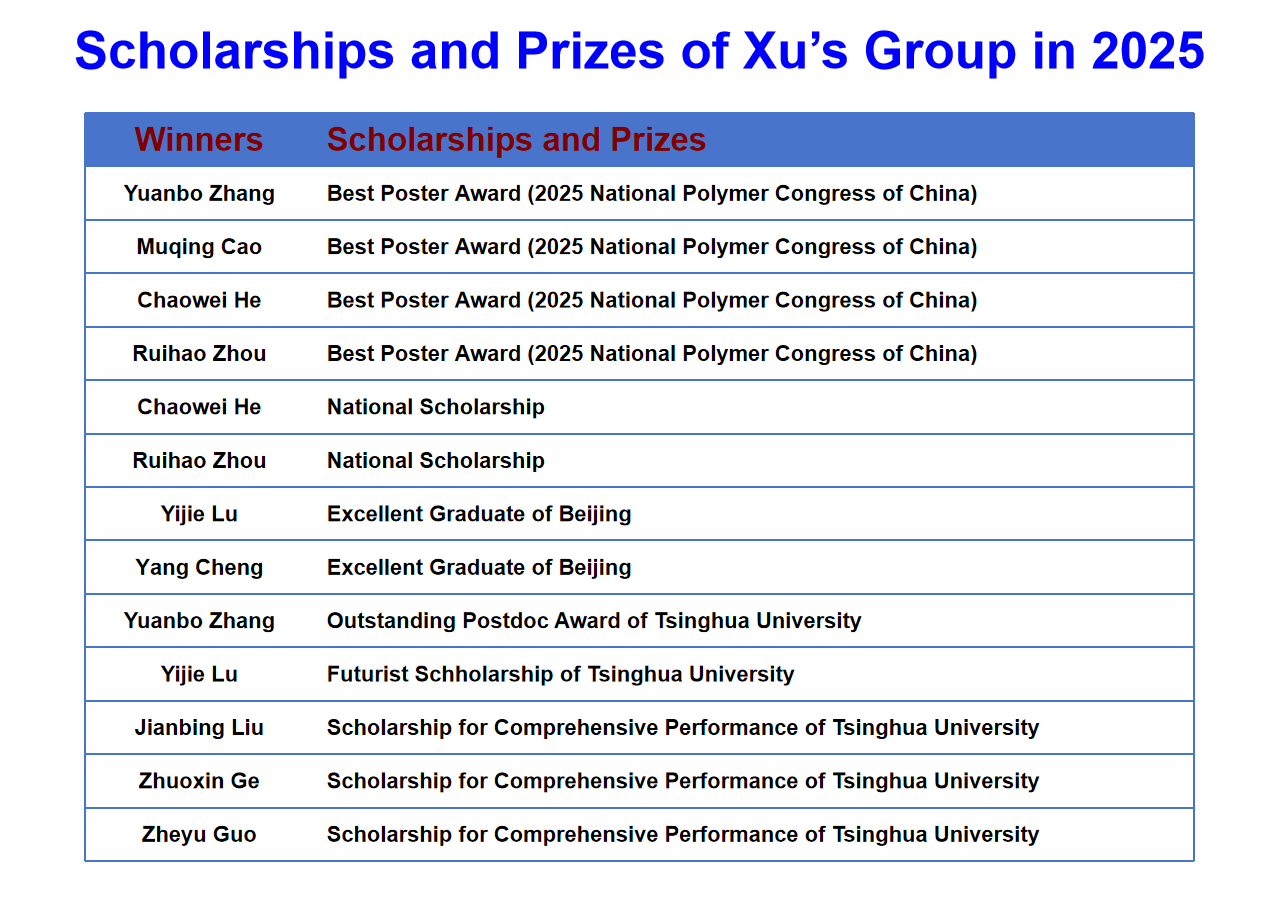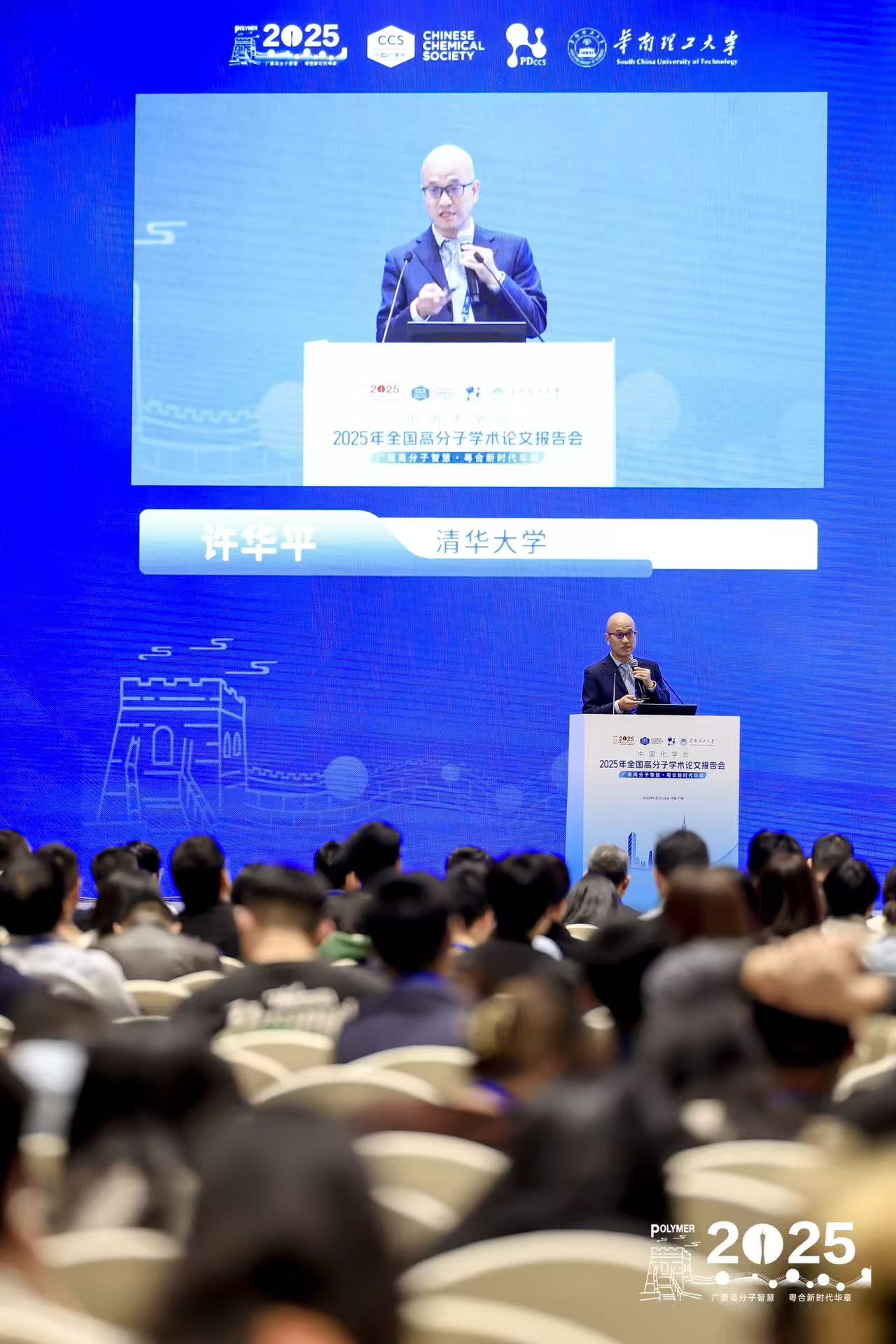
Author: wanglu
Happy New Year!
Photo-responsive Intelligent Adaptive Material Systems: Light-controlled Topological Reconfiguration Polymers
Tiantian Yang, Huaping Xu*.
Acta Polymerica Sinica, 2025, 56, 2302.
Intelligent adaptive materials constitute a vital component of modern advanced material systems. Compared to other stimuli such as temperature and pH, light exhibit advantageous characters including cleanliness, renewability, and high spatiotemporal resolution. As a result, light-responsive intelligent adaptive materials have witnessed significant development in recent years, both in fundamental research and technological applications. They are now widely applied in frontier fields such as manufacturing, optoelectronics, and...
More
Prof. Huaping Xu attended Annual National Polymer Congress as plenary speaker

Prof. Huaping Xu delivered a plenary lecture titled "Selenium- and Tellurium-Containing Polymers" at the Annual National Polymer, held in Guangzhou from November 22nd to 26th, 2025. Ten members of his research group attended the conference. Four of them, Yuanbo Zhang, Muqing Cao, Chaowei He, and Ruihao Zhou, received the Outstanding Poster Award for their presentations.
More
Nanoshield Architecture Harnessing Neoantigen-Targeting Peptides Enables Durable Post-surgical Glioma Immunotherapy
Qiliang Yin. Jingjing Li, Jianhua Zhang, Jiyan Leng, Kexin Zhang, Xihui Gao, Fan Wang*, Qi Yue*, Chao Ma*, Huaping Xu, Xiaogang Liu, Hongjie Zhang, Kai Liu*
Nano Letters, 2025. 25(36): p. 13629-13638.
Despite advances in immunotherapy, its efficacy against postoperative glioma recurrence remains limited. Here, we present a neoantigen-targeting peptide nanoshield that synergizes with glioma resection to eliminate residual tumor cells and prevent relapse. The nanoshield architecture is constructed using a multicationic protein (MCP) as the structural scaffold, which is assembled with the mutat...
More
Se Polyurethane-Coated Titanium for Improved Osteogenesis and Immune Response
Mo Zhai, Banruo Xianyu, Honglin Zhang, Xiaoqiang Bai, Yang Fu, Zhuqing Wan, Wenke Zhang, Huaping Xu*, Yongsheng Zhou*, Longwei Lv*
Adv. Funct. Mater. 2025: e14534.
Titanium implants, although widely used in clinical applications, are still facing challenges of inflammation and compromised osseointegration, especially in diabetic and osteoporotic patients. Existing titanium modification techniques are confronted with problems of complicated manufacturing processes, poor bonding strength, and difficulties in dual regulation of immunity and osteogenesis. Here, a selenium-containing polyurethan...
More
Modified melanin for intestinal radioprotection via oral administration
Wei Chen, Hanjie Zhu, Ruotong Deng, Yuqing Qiao, Qing Ruan, Junbo Zhang, Yongxian Zhang, Yantao Niu, Huaping Xu*, Wei Cao*
Cell Biomaterials. 2025. 1(11).
Radiation-induced intestine injury is a common clinical complication in radiotherapy for abdominal and pelvic cancers. To date, oral radioprotective agents are still extremely rare because the harsh gastrointestinal environment would denature the drugs. Melanin, a natural polymer, has attracted attention for its potential radioprotective properties. However, the inherent low Z elements in natural melanin offer limited defense against radi...
More
Fluorescent Patterning via Visible Light-Triggered Dynamic Diselenide Exchange
Jianbing Liu, Peng Zhao, Yizheng Tan*, Huaping Xu*
Supramolecular Materials, 2025.4 : p. 100115.
Fluorescent polymeric materials have recently gained significant attention in diverse fields, including biological imaging, luminescent sensing, encryption, and anti-counterfeiting. However, the patterning of many materials mentioned above has primarily been achieved through soft lithography technology using ultraviolet light, which can cause unnecessary damage to the materials and is limited by a shallow penetration depth. Herein, we introduce oligo(p-phenylene vinylene) derivatives (cyano-OPVs)...
More
Achieving Mechanical Evolution in Polymer Materials Through Phase Evolution Induced by Visible Light
Cheng Liu, Chaowei He, Xiaobin Dai, Li-Tang Yan*, Huaping Xu*
Adv. Mater. 2025: e08549.
Can artificial polymer materials exhibit the characteristic of “evolution” over time, similar to biological tissue? The limitations arise from their inherently static nature and the absence of dynamic structures. A strategy is proposed for designing polymer materials whose phases and mechanical properties can be continuously transformed and enhanced temporally. Specifically, the polymer phases experience a sequence of transitions involving generation, separation, and fusion. Each period enhances mechanica...
More
Elemental Selenium/Tellurium in Polymer Assemblies: Responsive Innovation
Zhuoxin Ge, Yizheng Tan*, Huaping Xu*
Polym. Sci. Technol. 2025
In recent decades, significant advancements have been achieved in the field of polymer self-assembly. Among various polymer assemblies, the unique chemical properties of selenium and tellurium have established a robust foundation for the development of functional polymer assemblies that incorporate these elements. Polymer assemblies containing selenium and tellurium have garnered significant attention due to their sensitive responsiveness to stimuli and their precise biological functions. In this review, we summarize the resea...
More

